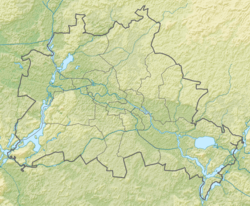| New Synagogue | |
|---|---|
German: Neue Synagoge | |
 The synagogue, in 2016 | |
| Religion | |
| Affiliation | Conservative Judaism |
| Rite | Nusach Ashkenaz |
| Ecclesiastical or organisational status | Synagogue |
| Leadership | Rabbi Gesa Ederberg |
| Status | Active |
| Location | |
| Location | Oranienburger Straße 29–31, Berlin |
| Country | Germany |
Location of the synagogue in Berlin | |
| Geographic coordinates | 52°31′29″N 13°23′40″E / 52.52472°N 13.39444°E |
| Architecture | |
| Type | Synagogue architecture |
| Style | Moorish Revival |
| Groundbreaking | 1859 |
| Completed | 1866 |
| Specifications | |
| Capacity | 3,200 seats |
| Dome(s) | Three |
| Website | |
| centrumjudaicum | |
The New Synagogue (German: Neue Synagoge) on Oranienburger Straße in Berlin is a mid-19th century synagogue built as the main place of worship for the city's Jewish community, succeeding the Old Synagogue which the community outgrew. Because of its Moorish style and resemblance to the Alhambra, the New Synagogue is an important architectural monument in Germany.
The building was designed by Eduard Knoblauch. Following Knoblauch's death in 1865, Friedrich August Stüler took responsibility for the majority of its construction as well as for its interior arrangement and design. It was inaugurated in the presence of Count Otto von Bismarck, then Minister President of Prussia, in 1866. One of the few synagogues to survive Kristallnacht, it was badly damaged prior to and during World War II and subsequently much was demolished; the present building on the site is a reconstruction of the ruined street frontage with its entrance, dome and towers, along with only a few rooms behind. It is truncated before the point where the main hall of the synagogue began.
